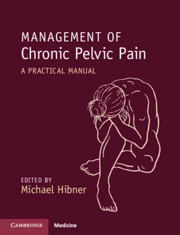Book contents
- Management of Chronic Pelvic Pain
- Management of Chronic Pelvic Pain
- Copyright page
- Contents
- Contributors
- Foreword
- Chapter 1 Introduction to Chronic Pelvic Pain
- Chapter 2 Neurobiological Basis of Pelvic Pain
- Chapter 3 History and Evaluation of Patients with Chronic Pelvic Pain
- Chapter 4 Psychological Assessment of a Female Patient with Chronic Pelvic Pain
- Chapter 5 Musculoskeletal Assessment for Patients with Pelvic Pain
- Chapter 6 Pharmacological Management of Patients with Pelvic Pain
- Chapter 7 Evidence for Surgery for Pelvic Pain
- Chapter 8 Pelvic Pain Arising from Endometriosis
- Chapter 9 Bladder Pain Syndrome
- Chapter 10 Pelvic Pain Arising from Pelvic Congestion Syndrome
- Chapter 11 Irritable Bowel Syndrome
- Chapter 12 Vulvodynia
- Chapter 13 Pelvic Pain Arising from Adhesive Disease
- Chapter 14 Pelvic Pain Arising from Ovarian Remnant Syndrome
- Chapter 15 Pudendal Neuralgia
- Chapter 16 Other Peripheral Pelvic Neuralgias
- Chapter 17 Chronic Pain After Gynecological Surgery
- Chapter 18 Pain Arising from Pelvic Mesh Implants
- Chapter 19 Treatment of Sexual Dysfunction Arising from Chronic Pelvic Pain
- Chapter 20 Physical Therapy Interventions for Musculoskeletal Impairments in Pelvic Pain
- Chapter 21 If Everything Else Fails
- Index
- References
Chapter 11 - Irritable Bowel Syndrome
Published online by Cambridge University Press: 08 March 2021
- Management of Chronic Pelvic Pain
- Management of Chronic Pelvic Pain
- Copyright page
- Contents
- Contributors
- Foreword
- Chapter 1 Introduction to Chronic Pelvic Pain
- Chapter 2 Neurobiological Basis of Pelvic Pain
- Chapter 3 History and Evaluation of Patients with Chronic Pelvic Pain
- Chapter 4 Psychological Assessment of a Female Patient with Chronic Pelvic Pain
- Chapter 5 Musculoskeletal Assessment for Patients with Pelvic Pain
- Chapter 6 Pharmacological Management of Patients with Pelvic Pain
- Chapter 7 Evidence for Surgery for Pelvic Pain
- Chapter 8 Pelvic Pain Arising from Endometriosis
- Chapter 9 Bladder Pain Syndrome
- Chapter 10 Pelvic Pain Arising from Pelvic Congestion Syndrome
- Chapter 11 Irritable Bowel Syndrome
- Chapter 12 Vulvodynia
- Chapter 13 Pelvic Pain Arising from Adhesive Disease
- Chapter 14 Pelvic Pain Arising from Ovarian Remnant Syndrome
- Chapter 15 Pudendal Neuralgia
- Chapter 16 Other Peripheral Pelvic Neuralgias
- Chapter 17 Chronic Pain After Gynecological Surgery
- Chapter 18 Pain Arising from Pelvic Mesh Implants
- Chapter 19 Treatment of Sexual Dysfunction Arising from Chronic Pelvic Pain
- Chapter 20 Physical Therapy Interventions for Musculoskeletal Impairments in Pelvic Pain
- Chapter 21 If Everything Else Fails
- Index
- References
Summary
Irritable bowel syndrome (IBS) is another condition of the “evil quadruplets.” It often coexists with endometriosis and adds to the pain of this condition. The mainstay is pain that is worsened by food and improved by defecation. It is also important to remember that IBS is diagnosed based on symptoms, and endoscopy is often performed in those patients is done to rule out any other bowel disease. This condition is best managed by a gastroenterologist but it is important to note that quite a large number of patients with this condition have spasm of pelvic floor muscles and treatment of that spasm may improve some of the IBS symptoms.
- Type
- Chapter
- Information
- Management of Chronic Pelvic PainA Practical Manual, pp. 120 - 128Publisher: Cambridge University PressPrint publication year: 2021



